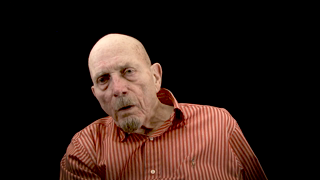2:12 | As the war starts winding down, Rogers and his men secure the highway out of Nuremberg, stopping those attempting to escape. (This interview made possible with the support of TIMOTHY R. COLLINS.)
Keywords : Autobahn Nuremberg Prisoner Of War (POW)

When Orlando native Chan Rogers is accepted into the Army Specialized Training Program, he believes he will enter the war as a fully trained engineer. But the army, desperate for combat leadership, pull him from school early and train him for infantry duty. (This interview made possible with the support of TIMOTHY R. COLLINS.)
While crossing the Atlantic, Rogers' convoy encounters a powerful hurricane, rendering half of the regiment seasick. They pull into Marseilles, France to find the ports completely destroyed by the German Army. (This interview made possible with the support of TIMOTHY R. COLLINS.)
Rogers travels 500 miles into France, destined for combat in the Vosges Mountains. While on patrol, he discovers a gruesome scene that he has trouble shaking off. (This interview made possible with the support of TIMOTHY R. COLLINS.)
What is it like for a Florida native, seeing snow for the first time, while simultaneously making first contact with the enemy? When Chan Rogers jumps into a freezing creek, he comes to regret it. (This interview made possible with the support of TIMOTHY R. COLLINS.)
Chan Rogers describes what would come to be his worst 4 days in the infantry. Assigned to protect a captured German position, his unit faced attacks from unrelenting Germans, and he must bring fallen buddies down the hill on pack mules. (This interview made possible with the support of TIMOTHY R. COLLINS.)
Chan Rogers experiences a couple of close calls on the Siegfried Line. His unit stumbles upon a nest of sleeping Germans, suddenly finding themselves in a harrowing firefight. Later, when facing off against a group of German pillboxes, they are showered with deadly shrapnel from tree bursts. (This interview made possible with the support of TIMOTHY R. COLLINS.)
Reassigned to the 45th Infantry Division as a platoon sergeant, Chan Rogers deals with deserters. (This interview made possible with the support of TIMOTHY R. COLLINS.)
Rogers and his men take Aschaffensburg, where they are engaged in several days of house-to-house combat. When facing a group of entrenched German soldiers, they must execute a clever plan to catch them off-guard. (This interview made possible with the support of TIMOTHY R. COLLINS.)
While occupying a small German town, Rogers encounters an infamous Nazi sympathizer - a former American. (This interview made possible with the support of TIMOTHY R. COLLINS.)
In Dachau, Rogers witnesses thousands of starving prisoners in a concentration camp. He remembers the many other displaced civilians, forced into labor, who suffered at the hands of the nazis. (This interview made possible with the support of TIMOTHY R. COLLINS.)
The taking of Munich becomes a symbol, for Chan Rogers, that the war has come to its end. Now transitioning to an occupying force, he faces the possibility of shipping out to the Pacific for an impending invasion of Japan. (This interview made possible with the support of TIMOTHY R. COLLINS.)
Chan Rogers returns to the US a hero, but is convinced that America's new role as peacekeeper will keep the country at war indefinitely. He has a career with the Army Corps of Engineers, and makes efforts to honor his fallen brothers. (This interview made possible with the support of TIMOTHY R. COLLINS.)
Retired Army Colonel Chan Rogers briefly describes the breakdown of infantry combat units in WWII. (This interview made possible with the support of TIMOTHY R. COLLINS.)